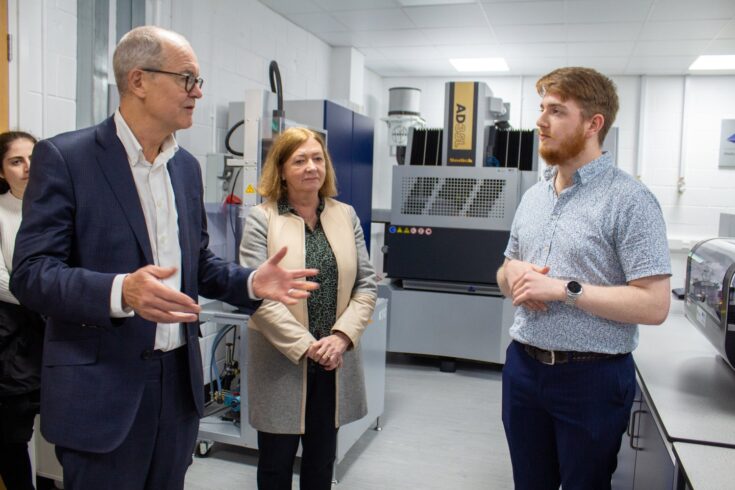Heriot-Watt University and the Medical Device Manufacturing Centre (MDMC) are helping Scottish small and medium-sized enterprises (SMEs) speed up the commercialisation of life-saving and life-changing medical technology.
MDMC is based on Heriot-Watt University’s Edinburgh campus, where, since opening in 2020, it has provided facilities and advice to companies who want to take their medical devices from concepts to commercial products.
Companies like Confidence Plus, whose ConfiPlus helps prevent leaks from stoma bags, which happen frequently and can be uncomfortable and embarrassing to wearers. Founder Anne Inch manufactured the ConfiPlus prototype using her own sewing machine and a disposable bed sheet after her husband’s stoma bag leaked nine times in a single day during a hospital stay.
MDMC is helping Confidence Plus achieve its goal of making ConfiPlus available on prescription and in care homes.
Supporting industry
Although it opened only two years ago, MDMC’s roots are in the early 2000s when Heriot-Watt University’s expertise in laser-based and other related manufacturing research was supported by Engineering and Physical Sciences Research Council (EPSRC) funding.
Continuous funding from EPSRC allowed Heriot-Watt to attract and develop a critical mass of researchers that work closely with industry. The researchers work in various sectors, from aerospace and defence to medical devices, working across the UK with a particular focus on central Scotland and companies such as Coherent, Leonardo and Renishaw.
Recently these researchers, together with engineering and clinical colleagues from across Scotland, secured funding from the Scottish government and European Regional Development Fund. The funding enabled MDMC to open its doors, providing expertise built over the previous 20 years to local SMEs developing medical device products.
MDMC’s Director, Professor Duncan Hand said:
Since 2020, MDMC has collaborated with more than 100 Scottish SMEs, providing a mixture of practical manufacturing support, advice on design for manufacture, and on medical device regulations.
The centre’s services and advice are free of charge to (so far mostly Scottish) SMEs. This saves modestly sized businesses the substantial cost of building prototypes and moulds for manufacture, as well as improving product design for manufacture and advising on regulatory issues.
Heriot-Watt spin-outs
As well as securing the funding that led to MDMC’s opening, Heriot-Watt University’s research, supported by EPSRC, has launched several spin-out companies in medical device manufacturing.
IntelliPalp Dx is a Heriot-Watt spin-out that is developing a device that can diagnose prostate cancer with more accuracy and less discomfort than existing methods. Because it’s more accurate, ProstaPalp™ could also reduce the number of biopsies, which can lead to complications such as infection and bleeding.
Prostate cancer is the most common cancer in males in the UK, and the number of cases is projected to increase by 12% between 2014 and 2035. A more accurate diagnostic device like ProstaPalp, which is currently seeking research and development funding, has real life-saving potential.
Professor Bob Reuben is a co-founder and the Chief Technology Officer of IntelliPalp Dx. He said:
IntelliPalp was rooted in EPSRC funding, which allowed us to develop the first prototype diagnostic device at Heriot-Watt.
EPSRC funding
According to Professor Duncan Hand, EPSRC funding has been key to supporting spin-outs like IntelliPalp Dx and developing relationships with start-ups as well as established companies:
The flexible funding provided by large grants such as the Centre for Innovative Manufacturing (CIM-Laser) and the Platform Grant Multi-Modal Manufacturing of Medical Devices (4MD) was particularly useful.
This flexibility enabled us to try new and innovative manufacturing approaches with industry partners, allowing us and them to take risks. It led to new techniques and approaches that can now be scaled up by industry.
The outputs of the 4MD grant include a technique for significantly reducing the manufacturing time of fibre-optic in-vivo medical devices. The time-saving technique could be used to commercialise micro-devices for cancer detection and precision laser surgery, which until now have been too expensive to manufacture at scale.
Top image: Sir Patrick Vallance and Professor Julie Fitzpatrick talking to a researcher, November 2022. Credit: Heriot-Watt University

